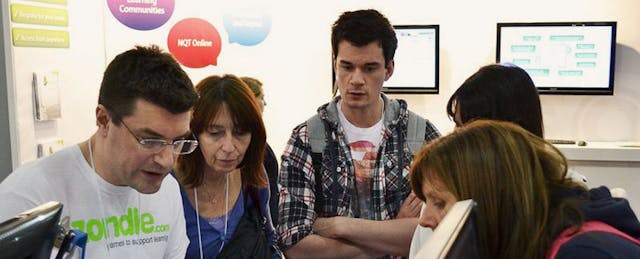The first time I traveled to England, a scrawny man with owlish glasses, irritated by something I said, sighed and offered this quip: “Ah, England and America. Two countries divided by a common language.”
That observation came to mind as I browsed the 16,000 square meter show floor of BETT, Europe’s largest education technology show, held from January 31 through February 2 in the yawning convention center on the outskirts of London. BETT is much like the US-based ISTE (scheduled this year in June in San Antonio). But the differences between the two, while subtle, speak volumes about the development of education technology industry in the US and UK.
First the stats:
| BETT | ISTE |
| 35 years old, run by conference group | 34 years old, run by nonprofit teacher association |
| Free admission | A couple of hundred dollars admission |
| expected up to 40,000 attendees in 2013 | 18,000 attendees in 2012 |
| International flavor: 30% attendees from outside the UK representing 130 countries | Strong professional development slant: features 200+ teacher-led workshops and sessions |
| 650 exhibitors | 500 exhibitors (2012) |
BETT had its roots as a classic vendor show, setting up cash registers and ringing up sales. These days, lectures are laced into the program. Even so, exhibits are at BETT's core. Along with dramatic booths by industry giants (Pearson, Google, Cisco, Intel), the home-grown companies were fascinating, including:
- Frog: Its platforms let primary and middle school students and teachers build apps dashboards. The 13-year old company, which employs about 120 people, released fresh software last year. In a joint venture with the YTL Group of Malaysia (part of a behemoth conglomerate), Frog won a contract to put its software in 10,000 Malaysian schools;
- Just2Easy: A company that has built a host of products since 1994 and has won awards at BETT for the past four consecutive years (this year for its web content creation software);
- Little Bridge: A virtual worlds program for learning English that has 2 million users in 30 countries. It started in 2007;
- ZU3D: A stop-motion animation package used in 1,000 schools throughout the UK. It was founded in 2008 and launched a fresh version of its software last year;
- Oddizzi: A program for teaching geography (built on Google Earth) started in 2012 by a teacher and used by 250 schools (mostly in the UK).
Scant--if any--venture money launched these companies. Many had teacher founders. Many (though not all) lack the data analytics and reporting backend favored by US startups. And all have charged for products from day one.
They didn't wind up taking that super scrappy startup entirely by choice. As long-time business mentor and investor, Richard Taylor described here, the UK has been slow to develop a venture or risk capital industry. Even so, many of the companies I saw exhibiting on the BETT floor got a toehold in the market during the administration of Prime Minister Tony Blair (from 1997 to 2007) who pumped funding for technology into schools.
UK school budgets for technology these days are slimmer. (BETT's organizers paid heed to this downturn by including for the first time, technology targeting learning in the workplace and higher education alongside the traditional grade school displays.)
That puts even these companies which have fought hard for customers in much the same quandary as their US startup cousins: they could use an injection of capital to fuel growth.
Startup incubators are just getting started in London: I helped judge a pitch competition of 15 teams (including one team of bold and bright students from Hackney UTC) organized by London-based EdMix, which is hosting edtech events and trying to fan the flame. (Editorial disclosure: EdMix helped cover some of travel costs for BETT.) Here's the full list of 15. Ireland’s Leaf Investments, a rare pure-play "learning" technology investment, was on the panel along with executives from Pearson and Adobe.
The EdMix "pitchfest" was a first for BETT--and showed a wide skew of ideas from a digital summer camp program, a program for locating tutors, an iPad content creation app called Doceri, and a variety of educational game programs.
The winner, EduVee, would feel right at home in Silicon Valley: its three, young technical cofounders have a big goal: to build adaptive STEM curriculum, combining both home-grown and available science content. The team will now get a year's free space--and mentoring--from Pearson.


